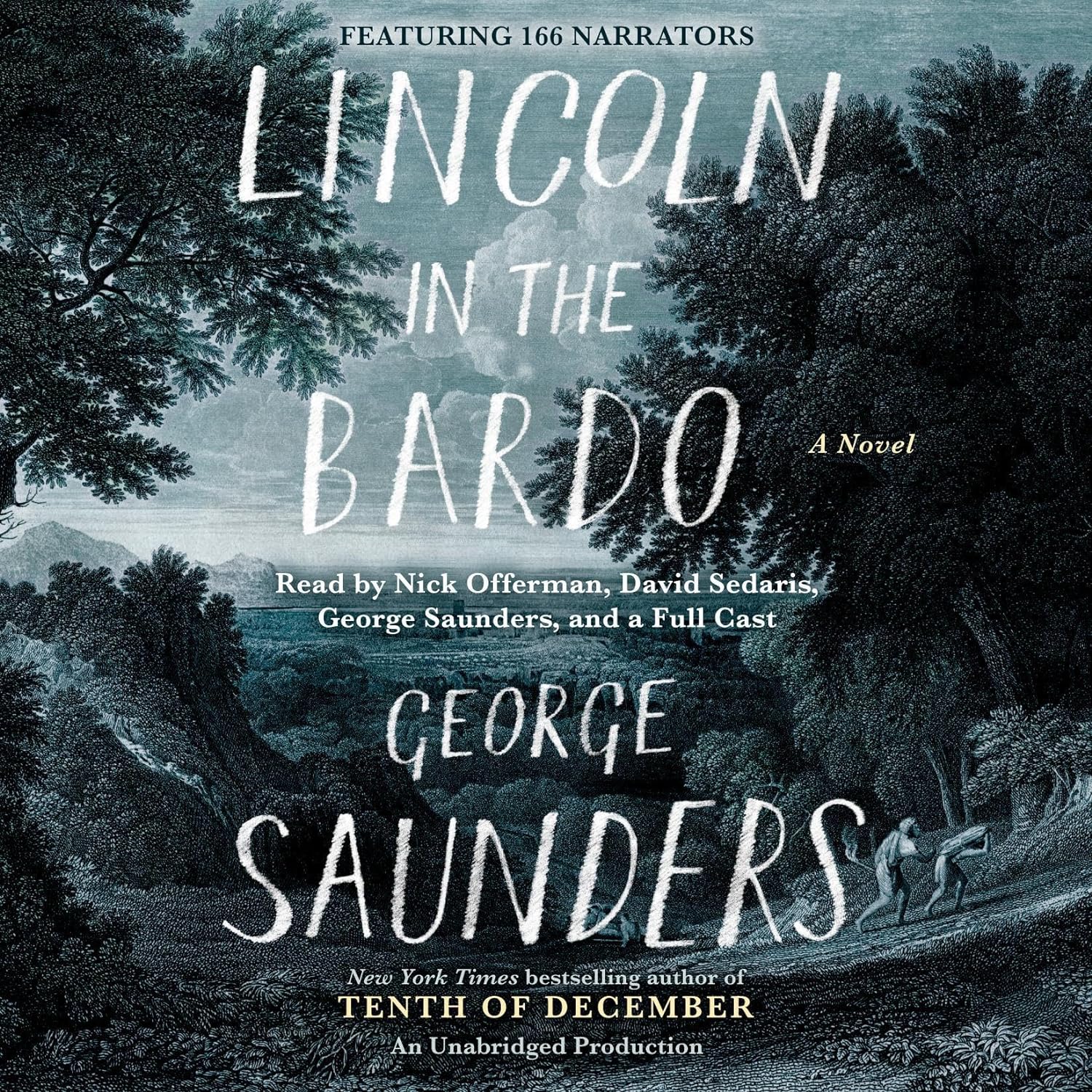
Armchair travel around the world!
Start your reading adventures with our FREE Reading Atlas.

- Around the World in 14 Books
- 7 Thrilling Book Series
- 6 Audiobooks That Are Like Theater For Your Ears



This historical fantasy (7 hours and 25 minutes) was published in February of 2017 by Random House Audio. The audiobook takes you to a ghost-riddled cemetery. David listened to Lincoln in the Bardo and loved it; it wouldn't be on our site if he didn't recommend it.
If you’ve not yet read this Booker Prize-winning novel, we’re here to gently nudge it into your hands.
Let us begin with the obvious: George Saunders is a good writer. He’s such a good writer that when the people who think about books at The New York Times set out to create a list of the Best 100 Books of the 21st Century, they included him three times. His ideas are interesting, and his novels are ‘experimental’ in a playful and unpretentious way. It all feels like we’re being invited into Saunder’s fanciful imagination.
So, what is this book about? And what does the title even mean?
Act I is primarily about Abraham Lincoln and the death of his son. William Lincoln died at the age of 11 in 1862, about nine months into the Civil War. The backbone of the novel is established: Historical fiction. There’s an explanation of the stuff that really happened and insights into people and the volatile times in which they lived.
But, running alongside that real-life narrative is an atmospheric fantasy story. This novel is historical, yes, but it’s also a ghost story. Many ghost stories, actually — because William arrives at the graveyard and meets the many other people there who are already dead.
It is in no way scary. It’s fantastical, sometimes funny, and frequently heartbreaking, with nary an attempt at a jump scare.
And the ghosts that William meets are fascinating. They’re richly drawn characters with full-blown personalities — many refuse to recognize that they’re dead. All of them are odd manifestations of who they were in life, including one who has ‘several sets of eyes — all darting to and fro; several noses, all sniffing.’ He has so many hands, eyes, and noses they obscure the rest of his body.
To the historical fiction and fantasy designations, add ‘coming-of-age story.’ But the age, rather than a number, is the age of death. Lincoln in the Bardo is about the process of letting go of life.
Bardo is a Buddhist idea that means a transitional state; it literally means ‘gap.’ The most famous bardo is the one between death and rebirth — this age and the next — but bardo can also refer to a suspended time in life, maybe an illness or a time between jobs.
For most of the novel, we’re in the bardo with William, Abraham Lincoln, and the rest of the ghosts. We move through the stories, hearing from all of them. There are also historical documents — both real and invented — that help tell the story. It’s a pastiche of views, voices, and descriptions; sometimes they agree, sometimes they do not. The ghosts complain and commiserate, muse and mingle — all on the way to gaining a better understanding of life in the afterlife.
Because it’s Saunders, this book is lovely on the page, but the lavishly produced audiobook — with a cast of 166 narrators including Nick Offerman, Bill Hader, Julianne Moore, and Megan Mullally — is the recommended way to go. Perhaps during a walk in a nearby cemetery or graveyard?
About noon, The President, Mrs. Lincoln, and Robert came down and visited the lost and loved one for the last time, together. They desired that there should be no spectator of their last sad moments in that house with their dead child & brother. They remained nearly 1/2 an hour. While they were thus engaged there came one of the heaviest storms of rain and wind that has visited this city for years, and the terrible storm without seemed almost in unison with the storm of grief within.
In _Witness to the Young Republic: A Yankee’s Journal, 1828–1870,’ by Benjamin Brown French, edited by D. B. Cole and J. J. McDonough. — George Saunders
Wanna help us spread the word? If you like this page, please share with your friends.
Strong Sense of Place is a website and podcast dedicated to literary travel and books we love. Reading good books increases empathy. Empathy is good for all of us and the amazing world we inhabit.
Strong Sense of Place is a listener-supported podcast. If you like the work we do, you can help make it happen by joining our Patreon! That'll unlock bonus content for you, too — including Mel's secret book reviews and Dave's behind-the-scenes notes for the latest Two Truths and a Lie.
Join our Substack to get our FREE newsletter with podcast updates and behind-the-scenes info — and join in fun chats about books and travel with other lovely readers.

We'll share enough detail to help you decide if a book is for you, but we'll never ruin plot twists or give away the ending.
Content on this site is ©2026 by Smudge Publishing, unless otherwise noted. Peace be with you, person who reads the small type.